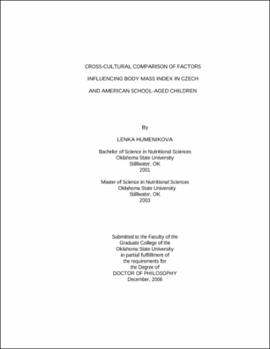| dc.contributor.advisor | Gates, Gail E. | |
| dc.contributor.author | Humenikova, Lenka | |
| dc.date.accessioned | 2013-11-26T08:26:19Z | |
| dc.date.available | 2013-11-26T08:26:19Z | |
| dc.date.issued | 2006-12 | |
| dc.identifier.uri | https://hdl.handle.net/11244/6861 | |
| dc.description.abstract | Scope and Method of Study: Previous research identified numerous factors that contribute to child obesity in the U.S., including excessive intakes of energy and fat and decreased physical activity. However, there is limited understanding of the factors that influence children's dietary and exercise behaviors. Despite the low nutrient density of the traditional diet, Czech adolescents have lower BMIfor-age than American adolescents. The purpose of our study was to explore the differences in dietary intakes, physical activity, and environmental factors that influence BMI-for-age between American and Czech children. Data for this correlational study came from 97 Czech and 47 American 4-6th graders and their parents. Children's dietary intakes and physical activity were evaluated using two 24-hour recalls and the modified Self-administered Physical Activity Checklist. Height, weight, and body image perceptions of children were measured. Parenting style, parental food-related practices, availability of healthy foods, and body image perceptions were measured using the Parent Questionnaire. | |
| dc.description.abstract | Findings and Conclusions: American children consumed more energy and fat, ate fewer fruits and vegetables, and participated in less physical activity than Czech children. American children reported visiting fast food restaurants more often than Czech children. An authoritative parenting style was used more often by American than Czech parents. Czech parents were more involved in the meal preparation and made healthy foods more available at home than American parents. American children had a smaller ideal body image than Czech children. The regression model did not explain a significant portion of the variance in children's BMI-for-age. Frequent involvement of parents in food preparations, a greater availability of healthy foods, and very limited consumption of fast foods may be responsible for the higher dietary quality among Czech children. Future interventions with American families should focus on increasing parental skills related to the preparation of healthy meals and snacks, and on teaching parents how to make such foods available to their children. Further investigation of factors that contribute to children's BMI-for-age both in the U.S. and the Czech Republic should be conducted with a large sample of American and Czech children from diverse backgrounds. | |
| dc.format | application/pdf | |
| dc.language | en_US | |
| dc.rights | Copyright is held by the author who has granted the Oklahoma State University Library the non-exclusive right to share this material in its institutional repository. Contact Digital Library Services at lib-dls@okstate.edu or 405-744-9161 for the permission policy on the use, reproduction or distribution of this material. | |
| dc.title | Cross-cultural comparison of factors influencing body mass index in Czech and American school-aged children | |
| dc.contributor.committeeMember | Johnson, Christine A. | |
| dc.contributor.committeeMember | Hermann, Janice | |
| dc.contributor.committeeMember | Parker, Stephany P. | |
| osu.filename | Humenikova_okstate_0664D_1990.pdf | |
| osu.accesstype | Open Access | |
| dc.type.genre | Dissertation | |
| dc.type.material | Text | |
| thesis.degree.discipline | Human Environmental Sciences | |
| thesis.degree.grantor | Oklahoma State University | |
